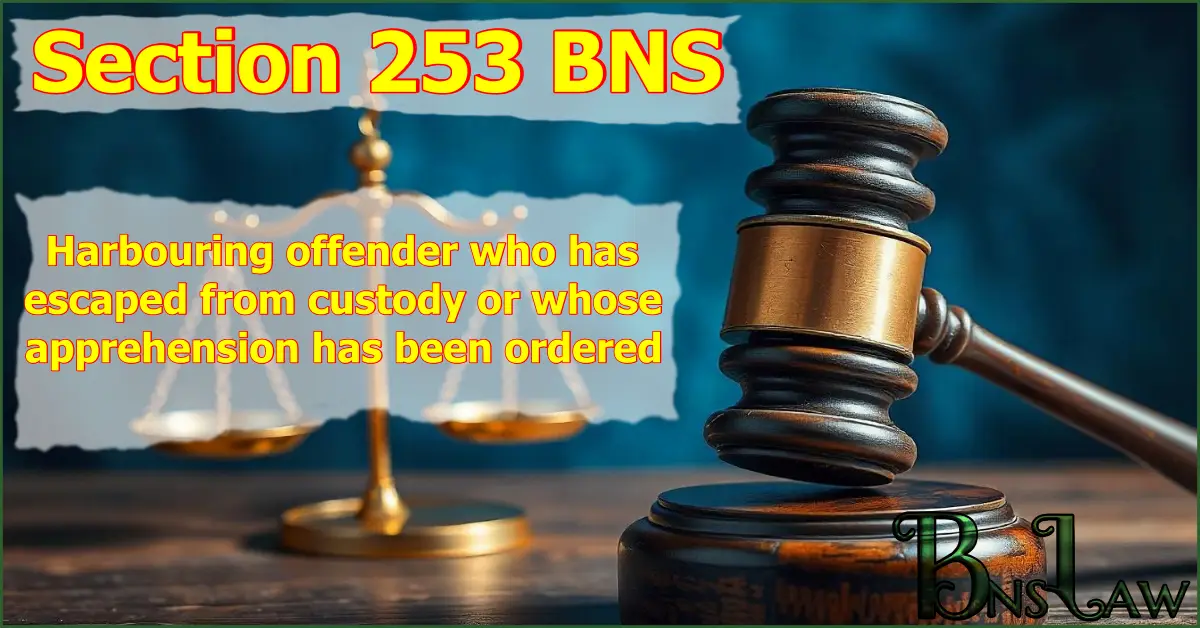Section 253 BNS | BNS 253 | BNS Section 253
Whenever any person convicted of or charged with an offence, being in lawful custody for that offence, escapes from such custody, or whenever a public servant, in the exercise of the lawful powers of such public servant, orders a certain person to be apprehended for an offence, whoever, knowing of such escape or order for apprehension, harbours or conceals that person with the intention of preventing him from being apprehended, shall be punished in the manner following, namely:—
253(a) BNS
if the offence for which the person was in custody or is ordered to be apprehended is punishable with death, he shall be punished with imprisonment of either description for a term which may extend to seven years, and shall also be liable to fine;
253(b) BNS
if the offence is punishable with imprisonment for life or imprisonment for ten years, he shall be punished with imprisonment of either description for a term which may extend to three years, with or without fine;
253(c) BNS
if the offence is punishable with imprisonment which may extend to one year and not to ten years, he shall be punished with imprisonment of the description provided for the offence for a term which may extend to one-fourth part of the longest term of the imprisonment provided for such offence, or with fine, or with both.
Explanation— “Offence” in this section includes also any act or omission of which a person is alleged to have been guilty out of India, which, if he had been guilty of it in India, would have been punishable as an offence, and for which he is, under any law relating to extradition, or otherwise, liable to be apprehended or detained in custody in India, and every such act or omission shall, for the purposes of this section, be deemed to be punishable as if the accused person had been guilty of it in India.
Exception— The provisions of this section do not extend to the case in which the harbour or concealment is by the spouse of the person to be apprehended.
READ OTHER SECTIONS OF CHAPTER XIV — OF FALSE EVIDENCE AND OFFENCES AGAINST PUBLIC JUSTICE
FAQs of BNS Section 253
-
253 BNS punishment and fine
Punishment and fine under Section 253 of the BNS—
253(a): Imprisonment for 7 years and fine.
253(b): Imprisonment for 3 years, with or without fine.
253(c): Imprisonment for one-fourth of the longest term provided for the offence, or fine, or both. -
253 BNS cognizable or not
The offence under Section 253(a, 253(b) and 253(c) of the BNS is cognizable.
-
253 BNS bailable or not
The offence under Section 253(a, 253(b) and 253(c) of the BNS is bailable.
-
253 BNS trial court
Offence specified in Section 253(a, 253(b) and 253(c) of the BNS is triable by the Magistrate of the first class.
Important Points
- Cognizable Offences: These are offences where a police officer can arrest a person without a warrant.
- Non-Cognizable Offences: These are offences where a police officer cannot arrest a person without a warrant.
- Bailable Offences: These are offences where the accused can get bail from the police station itself. All bailable offences are listed in the First Schedule of the Bharatiya Nagarik Suraksha Sanhita (BNSS).
- Non-Bailable Offences: Offences in which bail is not granted directly from the police station but after hearing the case in the court, the judge decides when bail will be granted. All non-bailable offences are listed in the first schedule of the Bharatiya Nagarik Suraksha Sanhita (BNSS).
- In the above FAQ, “trial court” means the court that has jurisdiction to try the offence.
- In the above FAQ, the expression “Magistrate of the first class” and “Any Magistrate” does not include Executive Magistrates.
Read other Sections of the BNS
Reference Link: New Criminal Laws (BNS), Ministry of Home Affairs







